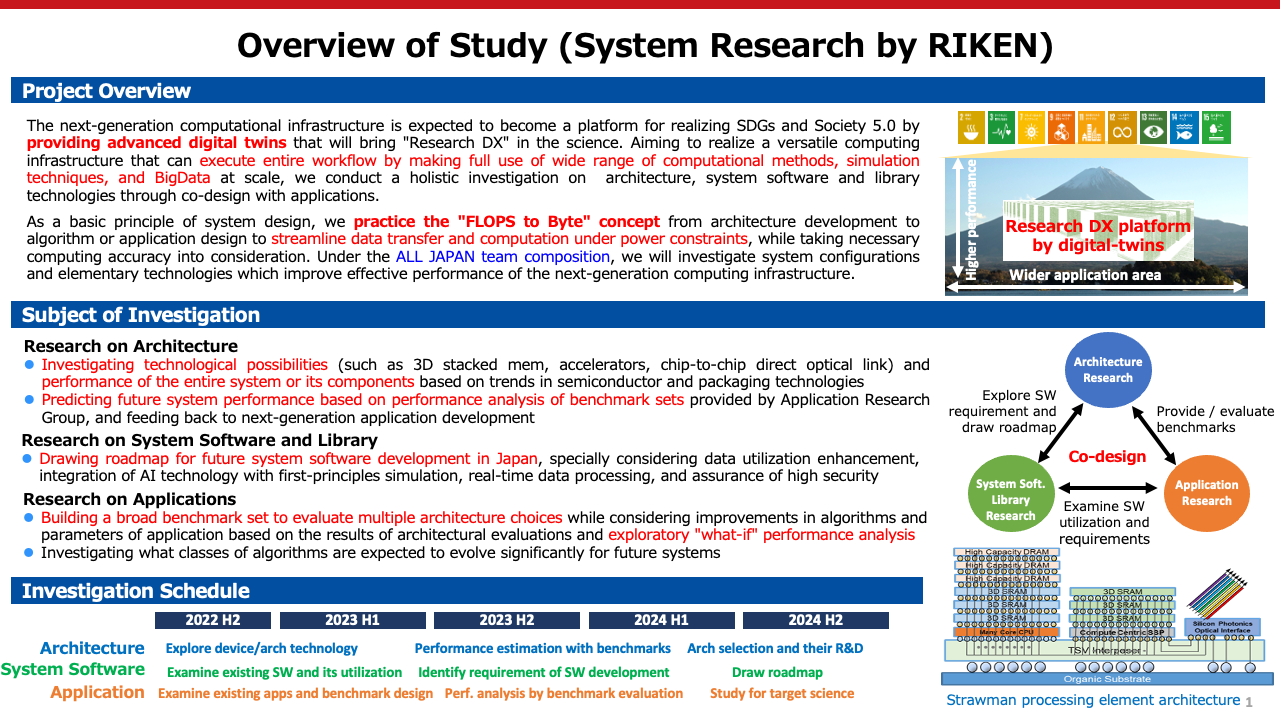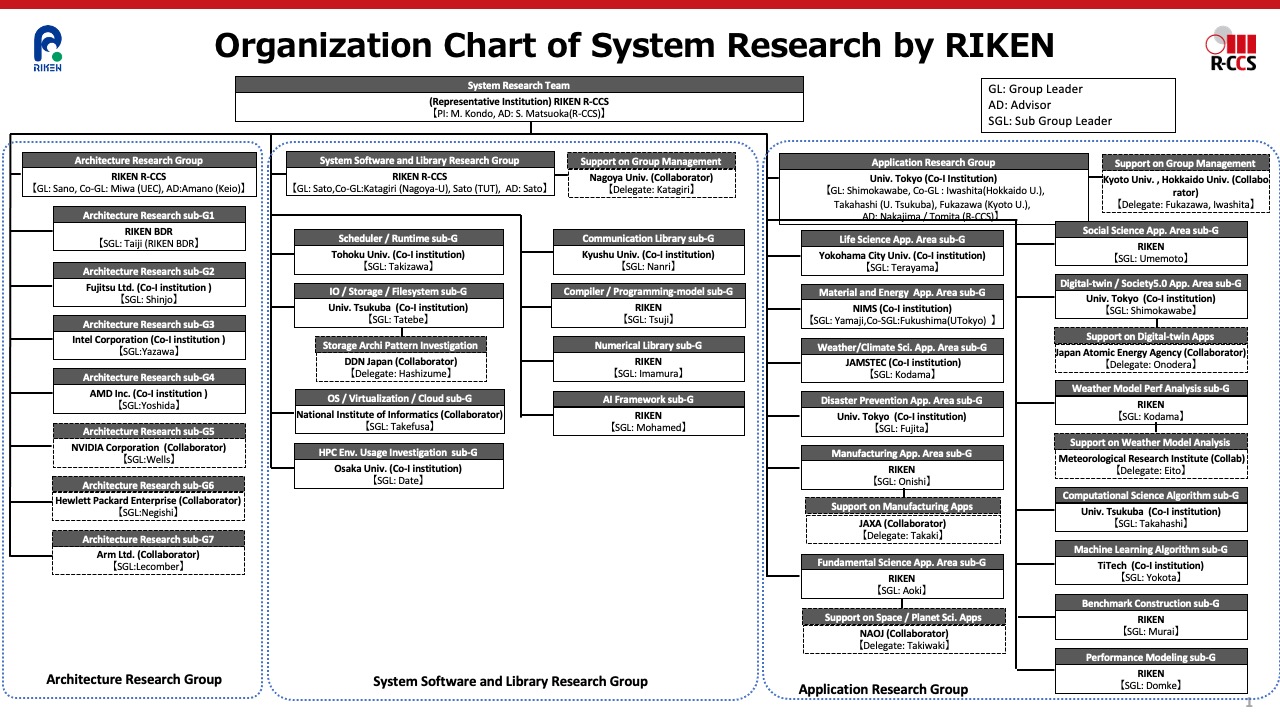TOP
 Research
Research
 Future Developments
Future Developments
 Feasibility Studies on Next-Generation Supercomputing Infrastructures (Aug 2022- )
Feasibility Studies on Next-Generation Supercomputing Infrastructures (Aug 2022- )
Feasibility Studies on Next-Generation Supercomputing Infrastructures (Aug 2022- )
JapaneseRIKEN has been selected as one of the representative institutions for the Feasibility Studies on next-generation supercomputing infrastructures (system research) by the Ministry of Education, Culture, Sports, Science and Technology (MEXT).
The purpose of this project is to propose options for the next-generation computing infrastructure for the post-"Fugaku" era, taking into account the needs of science, industry, and society, and to propose a next-generation system that can serve as a research DX infrastructure with an advanced digital twin, in order to realize a platform for solving issues for the realization of broad SDGs and Society 5.0.
To this end, we will survey the architecture, system software libraries, and applications of the next-generation computing infrastructure, and examine elemental technologies to identify the performance and functional requirements for the next-generation computing infrastructure, while identifying technical issues and limiting factors.
Project Overview
The next-generation computational infrastructure is expected to become a platform for realizing SDGs and Society 5.0 by providing advanced digital twins that will bring "Research DX" in the science. Aiming to realize a versatile computing infrastructure that can execute entire workflow by making full use of wide range of computational methods, simulation techniques, and BigData at scale, we conduct a holistic investigation on architecture, system software and library technologies through co-design with applications.
As a basic principle of system design, we practice the "FLOPS to Byte" concept from architecture development to algorithm or application design to streamline data transfer and computation under power constraints, while taking necessary computing accuracy into consideration. Under the ALL JAPAN team composition, we will investigate system configurations and elementary technologies which improve effective performance of the next-generation computing infrastructure.
Subject of Investigation
Research on Architecture
- Investigating technological possibilities (such as 3D stacked mem, accelerators, chip-to-chip direct optical link) and performance of the entire system or its components based on trends in semiconductor and packaging technologies
- Predicting future system performance based on performance analysis of benchmark sets provided by Application Research Group, and feeding back to next-generation application development
Research on System Software and Library
- Drawing roadmap for future system software development in Japan, specially considering data utilization enhancement, integration of AI technology with first-principles simulation, real-time data processing, and assurance of high security
Research on Applications
- Building a broad benchmark set to evaluate multiple architecture choices while considering improvements in algorithms and parameters of application based on the results of architectural evaluations and exploratory "what-if" performance analysis
- Investigating what classes of algorithms are expected to evolve significantly for future systems
Investigation Schedule
| Time | Architecture | System Software | Application |
|---|---|---|---|
| H2 2022 - H1 2023 | Explore device/arch technology | Examine existing SW and its utilization | Examine existing apps and benchmark design |
| H2 2023 - H1 2024 | Performance estimation with benchmarks | Identify requirement of SW development | Perf. analysis by benchmark evaluation |
| H1 2024 - H2 2024 | Arch selection and their R&D | Draw roadmap | Study for target science |
Organization Chart
Architecture Research Group
- Architecture Research Group: RIKEN R-CCS
- Architecture Research sub-G1: RIKEN BDR
- Architecture Research sub-G2: Fujitsu Ltd.
- Architecture Research sub-G3: Intel Corporation
- Architecture Research sub-G4: AMD Inc.
- Architecture Research sub-G5: NVIDIA Corporation
- Architecture Research sub-G6: Hewlett Packard Enterprise
- Architecture Research sub-G7: Arm Ltd.
System Software and Library Research Group
- System Software and Library Research Group: RIKEN R-CCS
Support on Group Management: Nagoya Univ. - Scheduler / Runtime sub-G: Tohoku Univ.
- IO / Storage / Filesystem sub-G: Univ. Tsukuba
Storage Archi Pattern Investigation: DDN Japan - OS / Virtualization / Cloud sub-G: National Institute of Informatics
- HPC Env. Usage Investigation sub-G: Osaka Univ.
- Communication Library sub-G: Kyushu Univ.
- Compiler / Programming-model sub-G: RIKEN
- Numerical Library sub-G: RIKEN
- AI Framework sub-G: RIKEN
Application Research Group
- Application Research Group: Univ. Tokyo
Support on Group Management: Kyoto Univ, Hokkaido Univ. - Life Science App. Area sub-G: Yokohama City Univ.
- Material and Energy App. Area sub-G: NIMS
- Weather/Climate Sci. App. Area sub-G: JAMSTEC
- Disaster Prevention App. Area sub-G: Univ. Tokyo
- Manufacturing App. Area sub-G: RIKEN
Support on Manufacturing Apps: JAXA - Fundamental Science App. Area sub-G: RIKEN
Support on Space / Planet Sci. Apps: NAOJ - Social Science App. Area sub-G: RIKEN
- Digital-twin / Society5.0 App. Area sub-G: Univ. Tokyo
Support on Digital-twin Apps: Japan Atomic Energy Agency - Weather Model Perf Analysis sub-G: RIKEN
Support on Weather Model Analysis: Meteorological Research Institute - Computational Science Algorithm sub-G: Univ. Tsukuba
- Machine Learning Algorithm sub-G: TiTech
- Benchmark Construction sub-G: RIKEN
- Performance Modeling sub-G: RIKEN


